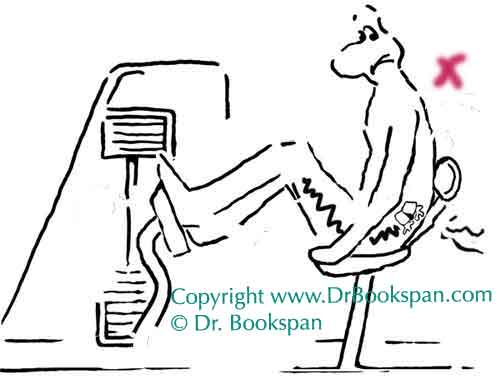Make sure you perform this lift properly
A colleague wrote a blog post recently about the leg press machine. He made some great points that I thought should be shared with you. So here are some of the reasons to be cautious with the leg press and some tips to perform this lift as safely as possible.
For many people when they want to do a lower body workout there are a lot of exercises they could choose from. They could perform squats, deadlifts, lunges, step ups, leg extensions, leg curls, leg presses with multiple variations of each of these.
But if we don't have a lot of experience in the weight room we may shy away fromt the free weight exercises. And as a result people tend to migrate towards the leg press machine.

And even if we're not a newbie to the gym we will sometimes opt for the leg press because it's one exercise where we can really load up the machine with lots of weight and feel strong.
But the leg press has some limitations. One of the biggest is that it results in a posterior tilt of the pelvis as the knees and hips flex to lower the platform.

And as the pelvis tilts posteriorly it causes the low back to go into flexion and increases the chance of disc herniation.

And nobody wants this. But there are certain things we can to minimize this from happening.
First, our core works the best for us when we establish proper posture. From the head down through the trunk we know this to mean:
* neutral head
* chest tall
* shoulders down and back
* neutral spine
If we can establish these positions prior to initiating the lift we'll do a better job of protecting the spine.
What we sometimes see happen are the following mistates:
* forward head
* flexed neck
* chest and shoulders rounded forward
So before we even attempt a rep we may be increasing the chance of injury if we don't establish proper posture.
Additionally there are a couple more things we can do ensure ideal technique on this lift which include:
1. Inhaling and holding a breath during the descent. This establishes intra-abdominal pressure which braces and stabilizes the spine.
2. Ensuring not to go too low. Normally most people don't go low enough with the range of motion on their leg training. On the leg press however you've got to be careful to not push too low to the point where you lose lumbar control.
For point #2 you want to ensure your low back doesn't roll away from the padding.
While I still believe ground-based, free weight exercises such as the squat and deadlift are your best choices for lower body development there will be some who will look to the leg press machine. If you are one of these people make sure to keep these points in mind to get the most benefit in the safest way possible.
All the best,
Chris okanaganpeakperformance.com 'always moving forward'
For many people when they want to do a lower body workout there are a lot of exercises they could choose from. They could perform squats, deadlifts, lunges, step ups, leg extensions, leg curls, leg presses with multiple variations of each of these.
But if we don't have a lot of experience in the weight room we may shy away fromt the free weight exercises. And as a result people tend to migrate towards the leg press machine.

And even if we're not a newbie to the gym we will sometimes opt for the leg press because it's one exercise where we can really load up the machine with lots of weight and feel strong.
But the leg press has some limitations. One of the biggest is that it results in a posterior tilt of the pelvis as the knees and hips flex to lower the platform.

And as the pelvis tilts posteriorly it causes the low back to go into flexion and increases the chance of disc herniation.

And nobody wants this. But there are certain things we can to minimize this from happening.
First, our core works the best for us when we establish proper posture. From the head down through the trunk we know this to mean:
* neutral head
* chest tall
* shoulders down and back
* neutral spine
If we can establish these positions prior to initiating the lift we'll do a better job of protecting the spine.
What we sometimes see happen are the following mistates:
* forward head
* flexed neck
* chest and shoulders rounded forward
So before we even attempt a rep we may be increasing the chance of injury if we don't establish proper posture.
Additionally there are a couple more things we can do ensure ideal technique on this lift which include:
1. Inhaling and holding a breath during the descent. This establishes intra-abdominal pressure which braces and stabilizes the spine.
2. Ensuring not to go too low. Normally most people don't go low enough with the range of motion on their leg training. On the leg press however you've got to be careful to not push too low to the point where you lose lumbar control.
For point #2 you want to ensure your low back doesn't roll away from the padding.
While I still believe ground-based, free weight exercises such as the squat and deadlift are your best choices for lower body development there will be some who will look to the leg press machine. If you are one of these people make sure to keep these points in mind to get the most benefit in the safest way possible.
All the best,
Chris okanaganpeakperformance.com 'always moving forward'
Stay Informed
When you subscribe to the blog, we will send you an e-mail when there are new updates on the site so you wouldn't miss them.
Comments